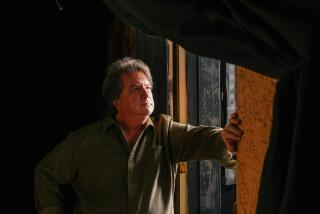In ‘Dunsinane,’ David Greig offers a timely play -- set in 11th century
A powerful, righteous nation makes a military excursion into a troubled, complicated, divided country, determined to bring democratic lightness where there has been factional darkness.
Predictions are made that the invaders will be cheered in the streets. Instead, they are perceived as a dangerous other. The invading forces are resented, and individual members of those forces, perplexed by things not going as planned, find themselves bogged down in a hostile land on a deadly mission of ambivalent purpose.
Sound familiar?
Our inability to learn from history certainly has been useful for the Scottish playwright David Greig, and for his drama “Dunsinane,” in which English forces invade Scotland in the 11th century only to find themselves trapped in a Gaelic version of what the great English novelist E.M. Forster would later call a “muddle” when writing of British folly in India.
But Greig has found that though the countries involved may change across the centuries, events still play out in remarkably similar ways.
“When I began plotting ‘Dunsinane,’” Greig said via telephone, “I was thinking about Britain’s involvement in Iraq and of Tony Blair as a figurehead, a man who is truly in pursuit of good but whose pursuit leads him into darker territory. When the play went to London, the story was Afghanistan. When the play was touring Scotland, the story was the referendum — it was all about Scotland and England. And when the play went to Russia, the story was the Ukraine.”
“Dunsinane,” now at the Wallis Annenberg Center for the Performing Arts in Beverly Hills after a sold-out run at the Chicago Shakespeare Theater, is a touring production of the National Theatre of Scotland, a company established only in 2006 and notable for its lack of a building (the Royal Shakespeare Company, which first produced the play at the Hampstead Theatre in London in 2010, is a co-producer).
That lack of real estate has allowed the still-youthful National Theatre of Scotland a notable freedom to fit spaces more specifically with theater pieces and to spend more time touring than other national arts institutions around the globe. “Dunsinane,” which has been on several tours to different parts of the world, has drawn critical praise and full houses — so big a hit, says the director Roxana Silbert, that there is a now a pool of actors who come in and out of the show, based on their availability.
Past National Theatre of Scotland work includes Gregory Burke’s “Black Watch,” the widely acclaimed play dealing with the role of the Black Watch regiment in Iraq; a production of “Macbeth” starring Alan Cumming; and another distinctive Greig piece, “The Strange Undoing of Prudencia Hart.”
“Dunsinane” could be called “the strange undoing of Lady Macbeth.”
Greig’s play is, to some extent, a sequel to William Shakespeare’s great tragedy, albeit with one notable difference: Lady M. is still very much alive and thus able to cause yet more trouble for the English.
In “Dunsinane,” she goes by Gruach, queen of Scotland (she is played by Siobhan Redmond), and much of the play is concerned with the widow’s relationship with the English commanding officer, Siward, played by Darrell D’Silva. Siward is trying to lead his young forces through this strange, frigid, boggy land, even losing his own son in the process. Gruach, meanwhile, is trying to exploit Siward’s apparent sexual interest in her and his ignorance of her nation to do the best for Scotland. And for herself.
Although Silbert describes the piece as “quite critical of Scotland,” “Dunsinane” has been seen by some in the Scottish media as a kind of patriotic refutation of “Macbeth,” a long-overdue, pro-Scot retelling of “the Scottish play,” minus William Shakespeare’s expedient English biases, given his demanding pro-Tudor patrons.
“A regime spin-doctor” is how Scottish critic Joyce McMillan recently characterized the Bard in the Scotsman, one of the country’s newspapers.
“There has long been a quiet murmur of rebellious criticism in Scotland against Shakespeare’s misrepresentation of a king who — according to Scottish chronicles — reigned for 17 years without reports of tyranny, and was viewed as ‘tall, golden-haired and generous,’” McMillan wrote as “Dunsinane” hit the United States. “The whole play can be read as a ‘dodgy dossier,’ an apology for invasion and colonization on the pretext of bringing civilization to a barbarous place.”
On the other hand, as Silbert points out, “Dunsinane” also paints a picture of a Scotland unable to function as a unified country. “The English are completely incapable of understanding anything that’s not like them,” Silbert said, “and so they invariably impose a kind of cultural rigidity. But in the play, in this Scotland, the Scots are all about who has the power, about figuring out who is going to win and then siding with the winners.”
Greig, while admiring of “Macbeth,” clearly has sympathy with McMillan’s view. “I always want to point out to people that ‘Macbeth’ was not an invented story,” he said. “There really was a Siward; there really was a battle of Dunsinane. I don’t see this so much as a sequel to ‘Macbeth’ as a play that takes the same fragment of Scottish history and tells a different chunk of it.”
In fact, the script for “Dunsinane” never mentions the word “Macbeth,” surely a nod to the theatrical tradition of never uttering such a bad-luck word inside a theater — at least without elaborate expunging rituals. Of course, it’s also a political statement.
“I am really not being cheeky to Shakespeare,” Greig insisted. “The play that is called ‘the Scottish play’ was, in fact, written by the greatest English playwright who ever lived, a playwright who had never visited Scotland at all. And yet it probably is the greatest Scottish play of all time. That is what is so annoying.”
Jones is the chief theater critic for the Chicago Tribune.
More to Read
The biggest entertainment stories
Get our big stories about Hollywood, film, television, music, arts, culture and more right in your inbox as soon as they publish.
You may occasionally receive promotional content from the Los Angeles Times.






